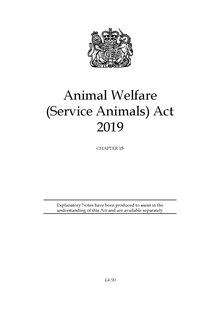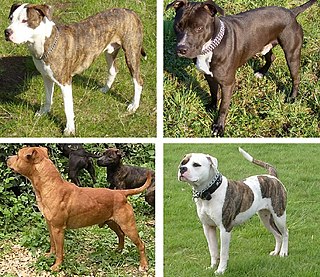
Pit bull is an umbrella term for several types of dog believed to have descended from bull and terriers. In the United States, the term is usually considered to include the American Pit Bull Terrier, American Staffordshire Terrier, American Bully, Staffordshire Bull Terrier, and sometimes the American Bulldog, along with any crossbred dog that shares certain physical characteristics with these breeds. In other countries, including the United Kingdom, the term is used as an abbreviation of the American Pit Bull Terrier breed specifically, while the Staffordshire Bull Terrier is not considered a pit bull. Most pit bull–type dogs descend from the British bull and terrier, a 19th-century dog-fighting type developed from crosses between the Old English Bulldog and the Old English Terrier.
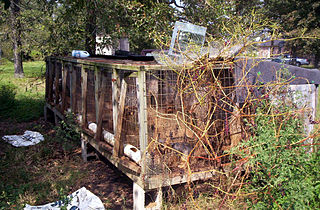
A puppy mill, also known as a puppy farm, is a commercial dog breeding facility characterized by quick breeding and poor conditions. Although no standardized legal definition for "puppy mill" exists, a definition was established in Avenson v. Zegart in 1984 as "a dog breeding operation in which the health of the dogs is disregarded to maintain a low overhead and maximize profits". They are cited as being a result of increased demand for household pets, especially after World War II. The Veterinary Medical Association of the Humane Society of the United States defines the main characteristics of a puppy mill as "emphasis on quantity over quality, indiscriminate breeding, continuous confinement, lack of human contact and environmental enrichment, poor husbandry, and minimal to no veterinary care."
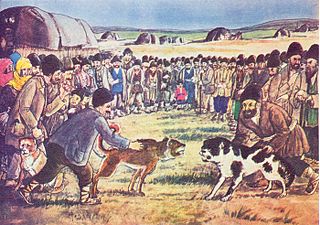
Dog fighting is a type of blood sport that turns game and fighting dogs against each other in a physical fight, often to the death, for the purposes of gambling or entertainment to the spectators. In rural areas, fights are often staged in barns or outdoor pits; in urban areas, fights are often staged in garages, basements, warehouses, alleyways, abandoned buildings, neighborhood playgrounds, or in the streets. Dog fights usually last until one dog is declared a winner, which occurs when one dog fails to scratch, dies, or jumps out of the pit. Sometimes dog fights end without declaring a winner; for instance, the dog's owner may call the fight.

Cruelty to animals, also called animal abuse, animal neglect or animal cruelty, is the infliction of suffering or harm by humans upon non-human animals, either by omission (neglect) or by commission. More narrowly, it can be the causing of harm or suffering for specific achievements, such as killing animals for entertainment; cruelty to animals sometimes encompasses inflicting harm or suffering as an end in itself, referred to as zoosadism. Divergent approaches to laws concerning animal cruelty occur in different jurisdictions throughout the world. For example, some laws govern methods of killing animals for food, clothing, or other products, and other laws concern the keeping of animals for entertainment, education, research, or pets. There are several conceptual approaches to the issue of cruelty to animals.

In law, breed-specific legislation (BSL) is a type of law that prohibits or restricts particular breeds or types of dog. Such laws range from outright bans on the possession of these dogs, to restrictions and conditions on ownership, and often establishes a legal presumption that such dogs are dangerous or vicious to prevent dog attacks. Some jurisdictions have enacted breed-specific legislation in response to a number of fatalities or maulings involving pit bull–type dogs or other dog breeds commonly used in dog fighting, and some government organizations such as the United States Army and Marine Corps have taken administrative action as well. Due to opposition to such laws in the United States, anti-BSL laws have been passed in 21 of the 50 state-level governments, prohibiting or restricting the ability of jurisdictions within those states to enact or enforce breed-specific legislation.

The Dangerous Dogs Act 1991 is an act of the Parliament of the United Kingdom prohibiting or restricting certain types of dogs and codifying the criminal offence of allowing a dog of any breed to be dangerously out of control. After a series of eleven dog attacks in 1991, Home Secretary Kenneth Baker promised "to rid the country of the menace of these fighting dogs". The Act has been controversial for failing to stem the rise of dog attacks and for focusing on a dog's breed or looks instead of an individual dog's behaviour.

The Hunting Act 2004 is an Act of the Parliament of the United Kingdom which bans the hunting of most wild mammals with dogs in England and Wales, subject to some strictly limited exemptions; the Act does not cover the use of dogs in the process of flushing out an unidentified wild mammal, nor does it affect drag hunting, where hounds are trained to follow an artificial scent.
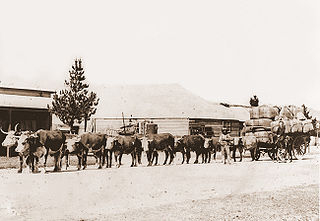
A working animal is an animal, usually domesticated, that is kept by humans and trained to perform tasks instead of being slaughtered to harvest animal products. Some are used for their physical strength or for transportation, while others are service animals trained to execute certain specialized tasks. They may also be used for milking or herding. Some, at the end of their working lives, may also be used for meat or leather.
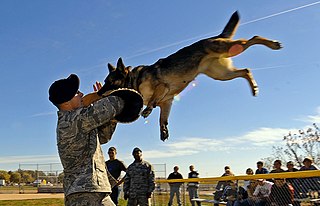
An attack dog is a dog trained to attack a person on command, sight, or by inferred provocation. They are used to defend people, territory, or property. Attack dogs have been utilized throughout history and are used today primarily in police and military roles. They have also been involved in a number of dog-related incidents and fatalities.

Dog meat, also known as fragrant meat or simply fragrant, is the meat derived from dogs. Historically human consumption of dog meat has been recorded in many parts of the world.

A dog bite is a bite upon a person or other animal by a dog. More than one successive bite is often called a dog attack, although dog attacks can include knock-downs and scratches. Though some dog bites do not result in injury, they can result in infection, disfigurement, temporary or permanent disability, or death. Another type of dog bite is the "soft bite" displayed by well-trained dogs, by puppies, and in non-aggressive play. Dog bites can occur during dog fighting, as a response to mistreatment, by trained dogs working as guard, police or military animals, or during a random encounter.

The Royal New Zealand Society for the Prevention of Cruelty to Animals is a New Zealand charitable society who work to promote the humane treatment of animals. The society consists of 30 animal shelters and 6 vet partnerships around New Zealand, including many in regional areas. Under the Animal Welfare Act 1999, SPCA inspectors have the exclusive power to investigate animal welfare complaints and prosecute abusers when necessary. The Royal NZ SPCA has initiated a range of animal welfare campaigns. It has launched public education campaigns about the humane treatment of animals, and has encouraged people to change their behaviour towards animals. SPCA has also run advocacy campaigns aimed at promoting law changes or questioning the legality of certain practices.

The Cruelty to Animals Act 1835 was an Act of the Parliament of the United Kingdom, intended to protect animals, and in particular cattle, from mistreatment. Its long title is An Act to Consolidate and Amend the Several Laws Relating to the Cruel and Improper Treatment of Animals, and the Mischiefs Arising from the Driving of Cattle, and to Make Other Provisions in Regard Thereto.

The Cruel Treatment of Cattle Act 1822 was an act of the Parliament of the United Kingdom with the long title "An Act to prevent the cruel and improper Treatment of Cattle"; it is sometimes known as Martin's Act, after the MP and animal welfare campaigner Richard Martin. It is the first known piece of animal welfare legislation in the world.
Dog theft is the crime of taking a dog from its owner. The theft of a dog to be held for ransom may be called dognapping, by analogy with kidnapping.

The Dogs Act 1953 is a British Act devised to protect livestock from dogs. The Act outlines punishment of dog owners whose dogs worry livestock on agricultural land. Protected livestock is defined as cattle, sheep, goats, swine, horses and domestic poultry. Game birds are specifically excluded.

Stephen Anthony McPartland is a former British Conservative Party Member of Parliament (MP) for Stevenage from 2010 to 2024. He is the author of the McPartland Review into Cyber Security as an enabler of Economic Growth, is a strategic consultant and non-executive specialist in risk, governance, cyber security and digital sustainability.

The dog meat industry is currently heavily restricted and soon to be illegal in South Korea. On January 9, 2024, the National Assembly of South Korea unanimously passed a law banning the production and sale of dog meat, to take effect in three years. The three-year window allows for farmers to find other sources of income. According to a 2020 survey of South Koreans, 83.8% of respondents reported to never having consumed dog meat before.

Animal welfare in the United Kingdom relates to the treatment of animals in fields such as agriculture, hunting, medical testing and the domestic ownership of animals. It is distinct from animal conservation.
Finn was a German Shepherd and retired police dog of the Hertfordshire Constabulary in England. In October 2016, Finn and his handler confronted a youth who was suspected of being armed; the dog was stabbed and the police officer injured to the hand with a large knife. The dog required emergency surgery, but he returned to duty eleven weeks later. The case received widespread media coverage and initiated a popular campaign to improve legal protection for animals in public service, resulting in a 2019 act of parliament known as "Finn's Law", which went into effect as law in England and Wales in June 2019. It was later proposed for incorporation into law in Scotland and Northern Ireland.
